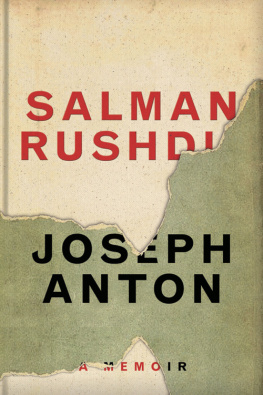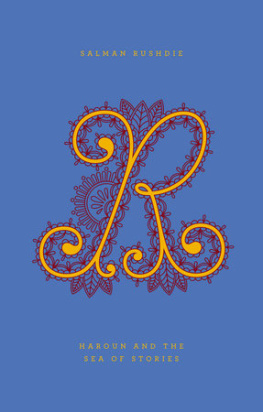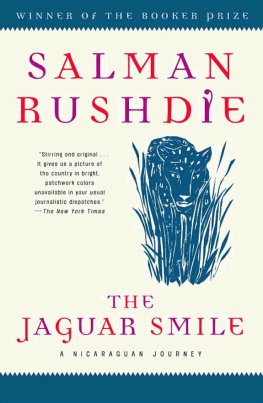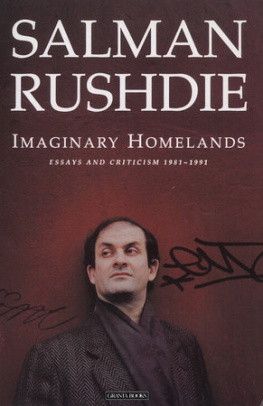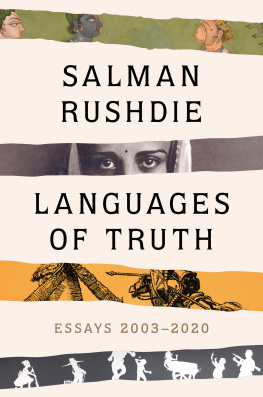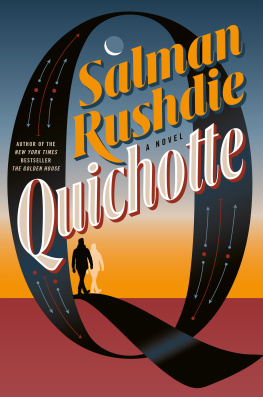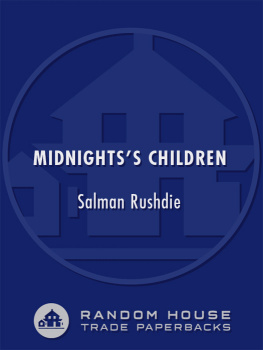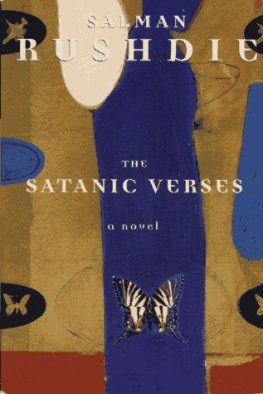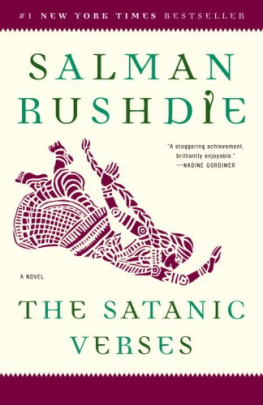Acknowledgments
I would like to thank all those whose help and advice shaped this memoir: everyone at Emory Universitys MARBL archives, without whose ordering and cataloging work over the last several years my papers would have been in far too chaotic a condition to allow me even to think about this project, and thanks to whom it became possible to write it; Vanessa Manko, for her invaluable media research; my editors at Random House, Louise Dennys, Dan Franklin, Will Murphy, and Susan Kamil, for their commentary on the draft text; and the books other early readers, Andrew Wylie, Sameen Rushdie, Elizabeth West, Aimee Mullins, Taryn Simon, Hanan al-Shaykh, Bill Buford, Ian McEwan, Pauline Melville, Reggie Nadelson, Min Katrina Lieskovsky, Francesco Clemente, Deepa Mehta and Christopher Hitchens, for their helpful responses. A few of the passages in these pages have appeared before, in somewhat different form, as essays and articles in various newspapers and magazines, notably The New Yorker and The New York Times. Thanks to Universal Studios for permission to quote from Evan Hunters screenplay of Alfred Hitchcocks The Birds; to Harvill Secker for permission to quote a passage from Mikhail Bulgakovs The Master and Margarita, translated by Michael Glenny; to New Directions for permission to quote parts of The Ivy Crown by William Carlos Williams; to George Braziller for permission to quote from the anthology For Rushdie; and to Lisa Appignanesi and Sara Maitland, editors of The Rushdie File, Carmel Bedford, editor of Fiction, Fact, and the Fatwa, as well the many other commentators whose thoughts and opinions are quoted throughout.
Some peoples names have been changed, for the most part those of the serving members of my protection teams, to all of whom, finally, I would like to express my very special thanks. If it had not been for the efforts of the officers of A Squad, Special Branch, Metropolitan Police, and their colleagues in the Special Intelligence Service (SIS) of the United Kingdom, I might not have been in a position to write thisor indeed any otherbook.
S.R.
ALSO BY SALMAN RUSHDIE
FICTION
Grimus
Midnights Children
Shame
The Satanic Verses
Haroun and the Sea of Stories
East, West
The Moors Last Sigh
The Ground Beneath Her Feet
Fury
Shalimar the Clown
The Enchantress of Florence
Luka and the Fire of Life
NONFICTION
The Jaguar Smile: A Nicaraguan Journey
Imaginary Homelands: Essays and Criticism 19811991
Step Across This Line: Collected Nonfiction 19922002
PLAYS
Haroun and the Sea of Stories (with Tim Supple and David Tushingham)
Midnights Children (with Tim Supple and Simon Reade)
SCREENPLAY
Midnights Children
ANTHOLOGIES
Mirrorwork: 50 Years of Indian Writing, 19471997 (coeditor)
Best American Short Stories 2008 (coeditor)
ABOUT THE AUTHOR
S ALMAN R USHDIE is the author of eleven novelsLuka and the Fire of Life, Grimus, Midnights Children (for which he won the Booker Prize and the Best of the Booker), Shame, The Satanic Verses, Haroun and the Sea of Stories, The Moors Last Sigh, The Ground Beneath Her Feet, Fury, Shalimar the Clown, and The Enchantress of Florenceand one collection of short stories, East, West. He has also published three works of nonfictionThe Jaguar Smile, Imaginary Homelands: Essays and Criticism 19811991, and Step Across This Lineand coedited two anthologies, Mirrorwork and Best American Short Stories 2008. He is a former president of American PEN.
I

A Faustian Contract in Reverse
W HEN HE WAS A SMALL BOY HIS FATHER AT BEDTIME TOLD HIM THE GREAT wonder tales of the East, told them and re-told them and re-made them and re-invented them in his own waythe stories of Scheherazade from the Thousand and One Nights, stories told against death to prove the ability of stories to civilize and overcome even the most murderous of tyrants; and the animal fables of the Panchatantra; and the marvels that poured like a waterfall from the Kathasaritsagara, the Ocean of the Streams of Story, the immense story-lake created in Kashmir where his ancestors had been born; and the tales of mighty heroes collected in the Hamzanama and the Adventures of Hatim Tai (this was also a movie, whose many embellishments of the original tales were added to and augmented in the bedtime re-tellings). To grow up steeped in these tellings was to learn two unforgettable lessons: first, that stories were not true (there were no real genies in bottles or flying carpets or wonderful lamps), but by being untrue they could make him feel and know truths that the truth could not tell him, and second, that they all belonged to him, just as they belonged to his father, Anis, and to everyone else, they were all his, as they were his fathers, bright stories and dark stories, sacred stories and profane, his to alter and renew and discard and pick up again as and when he pleased, his to laugh at and rejoice in and live in and with and by, to give the stories life by loving them and to be given life by them in return. Man was the storytelling animal, the only creature on earth that told itself stories to understand what kind of creature it was. The story was his birthright, and nobody could take it away.
His mother, Negin, had stories for him too. Negin Rushdie had been born Zohra Butt. When she married Anis she changed not just her surname but her given name as well, reinventing herself for him, leaving behind the Zohra he didnt want to think about, who had once been deeply in love with another man. Whether she was Zohra or Negin in her heart of hearts her son never knew, for she never spoke to him about the man she left behind, choosing, instead, to spill everyones secrets except her own. She was a gossip of world class, and sitting on her bed pressing her feet the way she liked him to, he, her eldest child and only son, drank in the delicious and sometimes salacious local news she carried in her head, the gigantic branching interwoven forests of whispering family trees she bore within her, hung with the juicy forbidden fruit of scandal. And these secrets too, he came to feel, belonged to him, for once a secret had been told it no longer belonged to her who told it but to him who received it. If you did not want a secret to get out there was only one rule: Tell it to nobody. This rule, too, would be useful to him in later life. In that later life, when he had become a writer, his mother said to him, Im going to stop telling you these things, because you put them in your books and then I get into trouble. Which was true, and perhaps she would have been well advised to stop, but gossip was her addiction, and she could not, any more than her husband, his father, could give up drink.
Windsor Villa, Warden Road, Bombay-26. It was a house on a hill and it overlooked the sea and the city flowing between the hill and the sea; and yes, his father was rich, though he spent his life losing all that money and died broke, unable to pay off his debts, with a stash of rupee notes in the top left drawer of his desk that was all the cash he had left in the world. Anis Ahmed Rushdie (B.A. Cantab., Bar-at-Law it proudly said on the brass nameplate screwed into the wall by the front door of Windsor Villa) inherited a fortune from the textile magnate father whose only son he was, spent it, lost it, and then died, which could be the story of a happy life, but was not. His children knew certain things about him: that in the mornings he was cheerful until he shaved, and then, after the Philishave had done its work, he grew irritable and they were careful to keep out of his way; that when he took them to the beach on the weekend he would be lively and funny on the way there but angry on the way home; that when he played golf with their mother at the Willingdon Club she had to be careful to lose, though she was a stronger player than he, because it was not worth her while to win; and that when he was drunk he grimaced hideously at them, pulling his features into bizarre and terrifying positions, which frightened them horribly, and which no outsider ever saw, so that nobody understood what they meant when they said that their father made faces. But when they were little there were the stories and then sleep, and if they heard raised voices in another room, if they heard their mother crying, there was nothing they could do about it. They pulled their sheets over their heads and dreamed.

